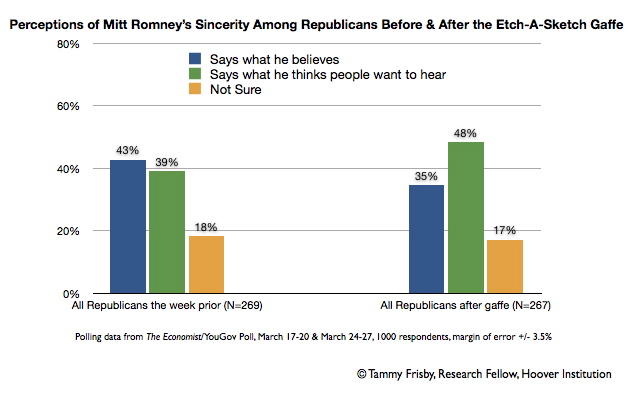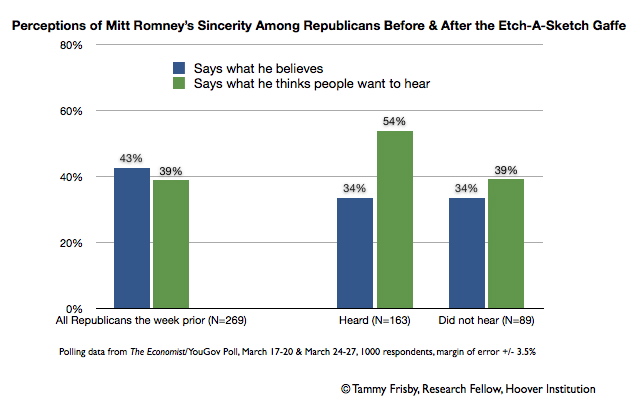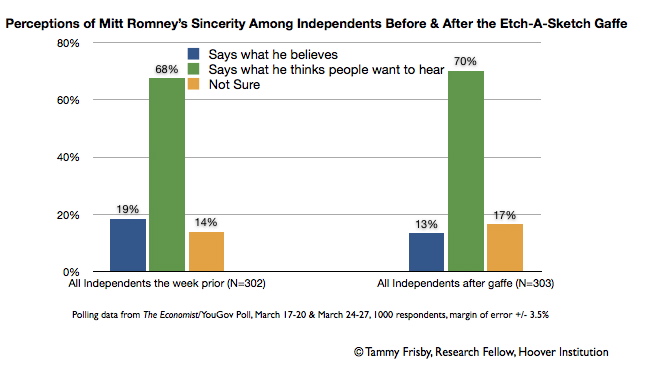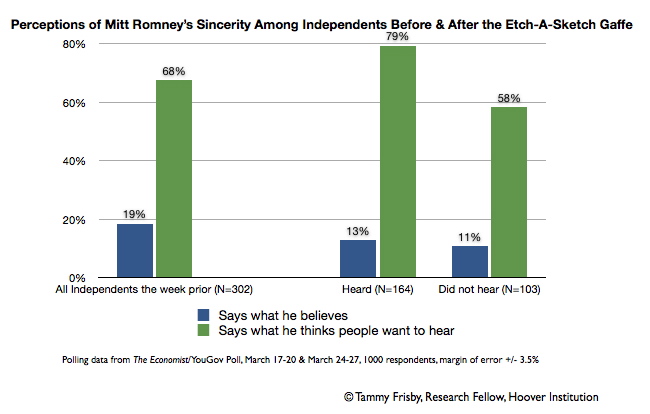After the Etch-A-Sketch gaffe last week, some Hoover colleagues and I were able to add a question about the incident to the weekly The Economist/YouGov poll. We wanted to know how aware of the gaffe Americans were. Once we knew who had heard about the gaffe and who had not, we could combine that information with the standard The Economist/YouGov poll question about Romney’s sincerity to see if an off-hand comparison to a classic children’s toy might have affected voters’ attitudes about Mitt Romney.
A disclaimer: This is circumstantial evidence - if for no other reason than a lot of other things also happened in the campaigns, politics, and the economy that week that might have impacted perceptions of Romney.
That said, what follows is not good news for the Romney campaign.
Let’s start with the Republicans.
As a group (whether they’d heard about the gaffe or not), self-identified Republicans viewed Romney as less sincere after the Etch-A-Sketch gaffe than they did the week before. When asked whether Romney “says what he believes” or “says what he thinks people what to hear,” only 35% of Republicans survey responded that Romney “says what he believes” (down from 43% the week before). After the gaffe, nearly one-half, 48%, responded that Romney “says what he thinks people want to hear,” up from 39% the week before.
If doubts about Romney’s sincerity are now more widespread, our data suggests that the biggest shift happened among Republicans who had heard about the Etch-A-Sketch gaffe.
We asked survey respondents:
In a TV interview this week, one of Mitt Romney's campaign advisers compared the Romney campaign's plan for switching from the Republican primary campaign into the campaign against President Obama to which children's toy?
Among those Republicans who had heard about the Etch-A-Sketch comparison, slightly more than half, 54%, responded that they think Mitt Romney, “says what he thinks people want to hear.” But only 39% of Republicans who had not heard about the comparison responded that way; the same percentage as all Republicans the week before. (I didn’t include data from respondents who chose Slinky - momentum! - or Rock ‘Em Sock ‘Em Robots.)
It’s harder to make a case that the gaffe changed perceptions among Independents. But that’s because Romney already has a big perception problem among Independents.
In the survey before the gaffe, only 19% of self-identified Independents responded that Romney “says what he believes.” After the gaffe, 13% gave that response. The percent responding that he “says what he thinks people want to hear” was nearly identical between the two surveys: 68% one week, 70% the next.
After the gaffe, Romney’s perception problem was greater among Independents who had heard about the comparison than among those who had not. 79% of Independents who had heard about the Etch-A-Sketch gaffe responded that Romney “says what he thinks people want to hear,” compared to 58% of Independents who had not heard.
But the stability in the numbers for all Independents before and after the gaffe prevents us from inferring anything about change among Independents who had heard or not heard about the gaffe.
If this damage to Romney’s reputation is real, it remains to be seen whether it will stick for more than a week. We’ll be asking the Etch-A-Sketch question again this week to try to get a handle on that.










